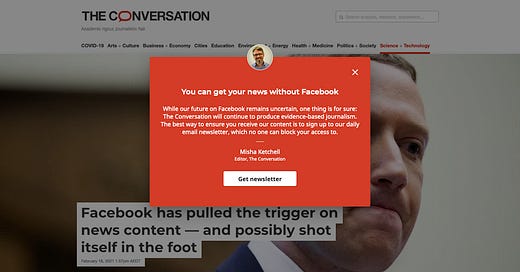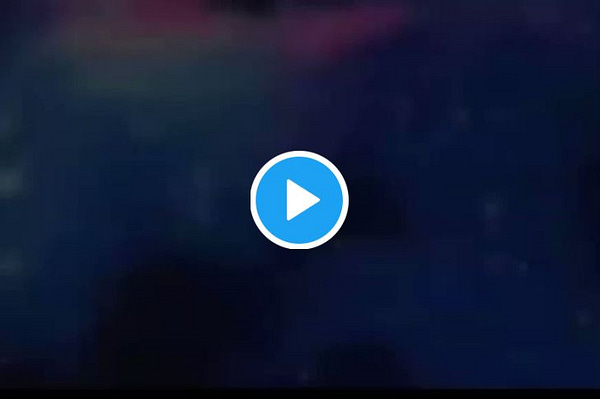a world without (news on) Facebook
Manila, 20 February—If you’re reading this, chances are you did not get referred here by Facebook. And that’s OK. I’m not a big fan of the platform, though I do keep it around as a ‘necessary evil’—there are work posts to post, group chats to keep alive, and of course, a handful of useful leads on Marketplace to check out.
That said, I’ve always hated how ubiquitous Facebook is. For this entry, I finally had the time to sit down and pore through We Are Social’s Digital 2021 report1, and found the following interesting figures:
Three global figures
4.66 Billion
Global internet users, 2021
4.2 Billion
Active social media users globally (nearly double the 2016 figure of 2.31 billion!)
2.74 Billion
Monthly active Facebook users around the globe as of Q3 2020 (up from 1.5 Billion in 2015!)
Two global figures re: why people use internet/social media
55.6%
Proportion of global population citing “keeping up-to-date with news and events” as their primary reason for using the internet
36.5%
Proportion of global internet users who use social media to stay up-to-date with news and current events
PH-specific figures
67%
Percentage of total population using the internet in the Philippines, 2021
10 hrs, 56 mins
Average amount of time spent on the internet each day in the Philippines, 2021 (number 1 in the world! #PinoyPride)
One Australian figure
63.9%
Proportion of adults in Australia who reported being concerned about “what is real and what is fake when it comes to news on the internet”
Anyway, we’re talking about Facebook in light of the social media giant’s recent move to restrict publishers and users in Australia from sharing and viewing news content2. This is in reaction to Australian legislation “requiring digital platforms such as Facebook and Google to pay news media companies whose content they host.”3
In an article for The Conversation4, Diana Bossio, associate professor at Swinburne University of Technology, writes:
The move is either a last-ditch attempt to gain concessions in the legislation, or a simple cut-and-run by Facebook… But this is probably more about flexing some muscle. Facebook may be demonstrating to the Federal government that if it doesn’t like the rules, it can damage national interests.
For one thing, the ban happened days before Australia’s COVID vaccine rollout. Instead of helping Australians connect and share safely5 while in the middle of a global emergency6, Facebook has instead chosen to put its own business interests first. Which is, you know, not really surprising.
“We are now at risk of an imbalance in the types of COVID-19 vaccine information available on social media, just when the public needs reassurance and evidence-based answers to their often quite reasonable questions,” writes Maryke Steffen7, Research Affiliate at the University of Sydney.
“People are really hungry for information right now. One of the main ways people get it is through social media. Public health organisations support people with concerns on social media by digesting complex information, translating it for non-scientists, and answering questions. And that’s why this timing is incredibly poor.”
I can’t quite articulate well how I feel about this ban. Of course, a part of me is concerned that there would be no way to combat misinformation on social media because posting news links—from supposedly credible sources—is disallowed.
Another part of me however has believed that the place of news is not on social media. It could be counter-intuitive, but now that it is no longer allowed to view or share news articles on Facebook, then anything that might look like news would definitely not be news—since it’s already disallowed. (“If you see it on Facebook=It’s NOT news”)
This also means that politicians and other parties with vested interests—even brands!—can no longer use Facebook and take advantage of their algorithms to boost and promote their paid advertorials, “legitimate” as they are, simply because they are “news content”. Though given Facebook’s attachment to political ad spending, there may very well be a loop hole for this particular issue—in favor of political ads, of course.
What I do hope comes out of this—and I can be an optimist sometimes—is, finally, some sort of “Post-Facebook” era. As Bossio notes, Facebook is already feeling the problem of an “ageing userbase”—younger people may be on Facebook, but are often inactive, and have already begun turning to other platforms such as Instagram (also Facebook-owned, btw) and TikTok (problematic in its own right).
“The reputational damage from blocking important sites that serve Australia’s public interest overnight – and yet taking years to get on top of user privacy breaches and misinformation – undermines the legitimacy of the platform and its claimed civic intentions.”
My dream really is for people’s online behavior toward news to change into one that seeks news, instead of being content with just what is being served via algorithm or regular programming.
Corollary to this dream are, of course, public online spaces8—spaces where people can gather and engage with each other without being surveilled, or subjected to a constant barrage of ads, or followed by cookies from one site to another. Where people can just be without being data points to be sold to someone. Possibility or simply delusions? I can’t really tell.
But a girl can dream, can’t she?
This week’s favorite meme is a mashup of Lady Gaga and Pokemon. Sound on, you’re welcome.
Thanks for making it this far, as always.
Happy weekend! Xo,
K
Reference List
We are Social. Digital 2021: the latest insights into the ‘state of digital’. https://wearesocial.com/uk/blog/2021/01/digital-2021-the-latest-insights-into-the-state-of-digital
Facebook. Changes to Sharing and Viewing News on Facebook in Australia. https://about.fb.com/news/2021/02/changes-to-sharing-and-viewing-news-on-facebook-in-australia/
The Conversation. Facebook has pulled the trigger on news content — and possibly shot itself in the foot. https://theconversation.com/facebook-has-pulled-the-trigger-on-news-content-and-possibly-shot-itself-in-the-foot-155547
Not a footnote reference, but I would just like to say I’m so in love with the concept of The Conversation, can we please have one like that here?
Facebook. Our Actions: Promoting Safety and Expression. https://about.fb.com/actions/promoting-safety-and-expression/
The Conversation. Banning news links just days before Australia’s COVID vaccine rollout? Facebook, that’s just dangerous. https://theconversation.com/banning-news-links-just-days-before-australias-covid-vaccine-rollout-facebook-thats-just-dangerous-155550
Ibid.
Wired. To mend a broken internet, create online parks. https://www.wired.com/story/to-mend-a-broken-internet-create-online-parks/






